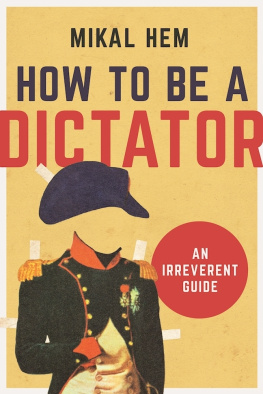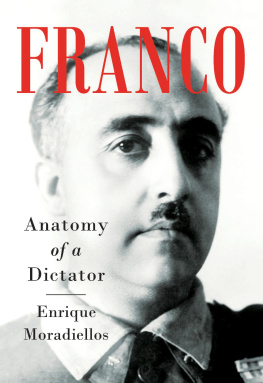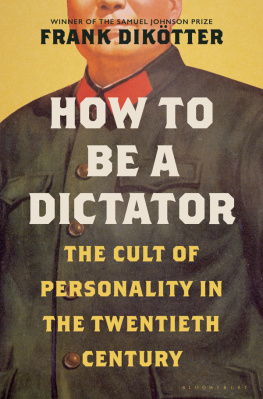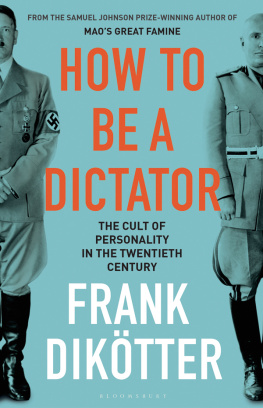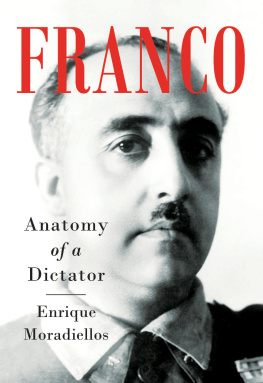International Praise for
How to Be a Dictator
An extraordinarily funny study of political thinking, serious beneath the surface, filled with dark humor and remarkable facts.
Dagbladet (Norway)
A serious subject handled in a most humorous way The details about the reign of small and large lunatics in a number of countries form the substance, but with his special take on the subject and his relaxed, dry humor, the book is very readable. It could just as well be read as a lesson in fun facts before quiz night as it can be a reminder of corruption, murder, and misgovernment.
Faedrelandsvennen (Norway)
Light and entertaining. Lots of facts. Youll want to know more about the dictatorships after reading the book.
Finansavisen (Norway)
Maybe How to Be a Dictator is for more than just laughs. The book is a funny reminder of how depressingly rich our flora of tyrants really is.
Klassekampen (Norway)
This book lets you know what to do to climb to the topand stay there. Useful advice and guidelines to avoid trouble are also included. Humorous!
Tnsberg Blad (Norway)
One might almost believe that President al-Sisi of Egypt had studied Mikal Hems thoroughly researched handbook, How to Be a Dictator. Al-Sisi fulfills almost all of the criteria that the Norwegian journalist points out for the successful way to create a dictatorship.
Die Presse (Austria)
4/5 stars: This collection of facts and anecdotes about style, wealth, and personality cults is entertaining to read while still remaining reasonably serious.
Stern (Germany)
5/6 stars: Mikal Hem has written a lively little book. His pitch-black satire exposes some of the worlds most dangerous and unintentionally comical people.
Jyllands-Posten (Denmark)
Copyright 2012 by Mikal Hem
English-language translation copyright 2017 by Skyhorse Publishing, Inc.
All rights reserved. No part of this book may be reproduced in any manner without the express written consent of the publisher, except in the case of brief excerpts in critical reviews or articles. All inquiries should be addressed to Arcade Publishing, 307 West 36th Street, 11th Floor, New York, NY 10018.
First English-language Edition
This edition is published by agreement with Kontext Agency.
Originally published in Norway in 2012 by Pax Forlag under the title Kanskje jeg kan bli diktator .
Arcade Publishing books may be purchased in bulk at special discounts for sales promotion, corporate gifts, fund-raising, or educational purposes. Special editions can also be created to specifications. For details, contact the Special Sales Department, Arcade Publishing, 307 West 36th Street, 11th Floor, New York, NY 10018 or .
Arcade Publishing is a registered trademark of Skyhorse Publishing, Inc., a Delaware corporation.
Visit our website at www.arcadepub.com.
10 9 8 7 6 5 4 3 2 1
Names: Hem, Mikal, 1973- author. | Pierce, Kerri A., translator.
Title: How to be a dictator : an irreverent guide / Mikal Hem ; translated from the Norwegian by Kerri Pierce.
Other titles: Kanskje jeg kan bli diktator. English
Description: New York : Skyhorse Publishing, Inc., [2017] | Includes bibliographical references.
Identifiers: LCCN 2017002215 (print) | LCCN 2017013312 (ebook) | ISBN 9781628726619 (ebook) | ISBN 9781628726602 (hardcover : alk. paper)
Subjects: LCSH: Dictatorship. | Dictators.
Classification: LCC JC495 (ebook) | LCC JC495 .H45 2017 (print) | DDC 321.9dc23
LC record available at https://lccn.loc.gov/2017002215
Cover design by Erin Seaward-Hiatt
Cover illustration by Andrew Howe/iStockphoto
Printed in the United States of America
CONTENTS
Introduction
THE APPEAL OF DICTATORSHIP
T HERE ARE MANY REASONS TO seek power. With power comes influence, control, admiration, and often wealth. Unfortunately, Western democracies place limits on just how much political power you can obtain. Consider the attention democratically elected leaders must pay to their political opposition, not to mention the waffling of voters between candidates. When voters tire of one political leader, they simply elect a new one into office.
Dictators, on the other hand, operate within an entirely different realm. Unburdened by opposing politicians or inquisitive media, dictators are in a much better position to realize their political and personal agenda. You can, for example, amass an enormous fortune, as most dictators do, without the people, the press, or any government agencies being the wiser. And should someone impudently try to shed light on your private affairs, why, you can simply change the law to ensure that such subversive behavior is a punishable offense. That is exactly what Azerbaijans president, Ilham Aliyev, did in June 2012. Following multiple revelations that the dictator and his family happened to control substantial portions of the countrys mining operations, telephone companies, and construction ventures, its parliament adopted laws granting the president and his wife immunity against prosecution for all crimes committed during his tenure. They also adopted a law banning the media from publishing information about the presidents business undertakings without explicit consent from those concerned.
And consider this: most people who claim to be God are whisked away for psychiatric treatment. Among dictators, however, it is entirely acceptable to elevate yourself to or juxtapose yourself with the Divine. Rafael Trujillo, former dictator of the Dominican Republic, once erected a large neon sign in Ciudad Trujillo, the capital, that read D IOS Y T RUJILLO , meaning God and Trujillo. The countrys churches were forced to display the slogan D IOS EN CIELO , T RUJILLO EN TIERRA , meaning God in Heaven, Trujillo on Earth. In neighboring Haiti, Franois Papa Doc Duvalier went a step further and appointed himself the highest deity in that countrys Voodoo religion. Ali Soilih, who governed the Comoro Islands for a few years during the 1970s, said: I am your God and teacher. I am the divine way, the torch that lights the dark. There is no God but Ali Soilih.
While other state heads must consider citizens wishes before erecting buildings and infrastructure, dictators are not limited by such petty considerations. They can erect enormous towers, monuments, or other vanity structures without worrying about open bidding and voter opinion. Take the Ivory Coasts Flix Houphout-Boigny, who built the worlds largest church in Yamoussoukro. The church has seven thousand seats equipped with embedded air ducts to cool the faithful, though it still remains mostly empty. Saparmurat Niyazov used billions of Turkmenistans petrodollars to transform the capital into a gleaming city of white marble. Other dictators have gone even further. Than Shwe of Burma and Nursultan Nazarbayev of Kazakhstan each built new capitals from the ground up.
Furthermore, dictators usually occupy power longer than their democratically elected colleagues. The list of heads of state who have been in power the longest is topped by despots. It must be acknowledged, of course, that democrats are more secure at the beginning of their term in office. For the first six months, they have only a 30 percent chance of being replacedcompared to authoritarians, who have almost a 50 percent chance. After this point, however, dictators hold the clear advantage. A democratically elected leader who has lasted the first six months in office has a 43 percent chance of losing his or her job within the next two years, while that chance stands at just 29 percent for authoritarians. Indeed, a measly 4 percent of all democrats manage to stay in power for ten years or more. The odds for dictators are nearly three times as high: 11 percent manage to hold office for a decade or longer.
Next page
